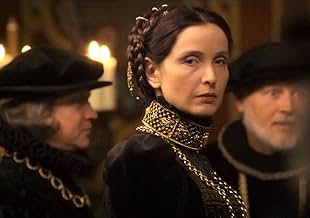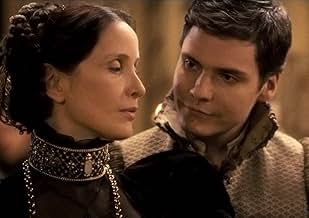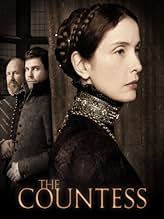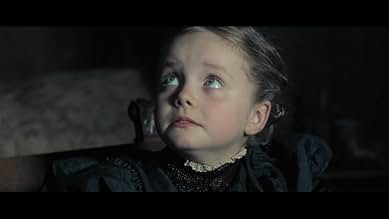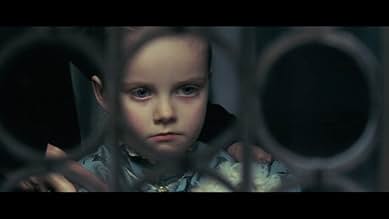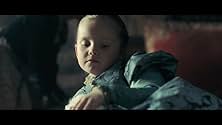IMDb RATING
6.2/10
8.9K
YOUR RATING
A 17th century Hungarian countess embarks on a murderous undertaking, with the belief that bathing in the blood of virgins will preserve her beauty.A 17th century Hungarian countess embarks on a murderous undertaking, with the belief that bathing in the blood of virgins will preserve her beauty.A 17th century Hungarian countess embarks on a murderous undertaking, with the belief that bathing in the blood of virgins will preserve her beauty.
- Awards
- 1 win & 1 nomination total
Andy Gätjen
- Miklos
- (as Andy Gatjen)
- Director
- Writer
- All cast & crew
- Production, box office & more at IMDbPro
Featured reviews
Film lovers and connoisseurs looking for a significant example of an auteur film from the first decade of the 3rd millennium can choose 'The Countess' without hesitation. Made in 2009 as a Franco-German co-production with international distribution, the film is written and directed by Julie Delpy, who also plays the title role. On top of that, she is also a co-producer and the composer of the film's music. The screenplay picks up a story that has already been told in dozens of books and films that adapt those books or invent original versions - the story of the bloody Countess Elisabeth (Erzsébet) Báthori, alleged serial killer and mother of all the heroes and heroines of 'Gothic' horror books and of vampire movies. She was a genuine character from Hungarian history of the 16th and 17th centuries, a woman whose real life has long been amplified and distorted by the legends built around her. Screenwriter Julie Delpy's version questions the historical accounts and the legends developed around them and focuses on the heroine's evolution and the origin of the deeds attributed to her. Without denying them, the story we see on the screen proposes a reading in a feminist key, in the political context of Central Europe of that historical period, superimposed on an unfortunate love story.
Erzsébet Báthori - whose name is spelled out in the film as Erzebet - is born in the 16th century in a small Hungary, which was desperately struggling to survive on the map of Europe. It is also a time of witches and of the Inquisition and an era in which women have few rights, even if they belong to the nobility. Destined from birth to a forced marriage, the heroine of the film goes through a childhood traumatized by violence followed by adolescence in which an unexpected pregnancy ends with the death penalty in terrible tortures of the lover (a boy from the peasants class). The husband is one of Hungary's great warriors, and upon his death (possibly poisoned by the king who owed him considerable fortunes, it is suggested) the countess takes over the husband's affairs with no intention of remarrying, as social conventions required. A love affair with a nobleman 18 years her junior has no chance, as he belongs to the Thurzo family, the Báthori clan's competitors in dominating what was left of Hungary. Erzsébet blames the failure of the relationship on the age difference, and is ready to do anything to erase it. A random incident makes her believe that the blood of young women, necessarily virgins, can at least physically restore the appearance of youth. Is it her decision, is this about a personality warped to murder, or because the encouragement she received from her enemies? Doom is inevitable, but is she alone responsible? Hell has many nuances, the director and screenwriter seems to say.
Julie Delpy tries to keep the balance between horror cinema and feminist drama, both in historical context. Scenes depicting the brutality and violence of the era are sprinkled throughout the film and generally consist of very brief flashes of seconds or less. Without denying the crimes attributed to the heroine, Julie Delpy avoids some details that have become common in legends (such as the bloodbaths) and questions the judgment applied to the heroine by contemporaries and history. She does it, unfortunately, using voice-over, a procedure that I like less and which seems to me unjustified considering the talent of the director in visually creating the relationships between the characters and reconstructing the era in its spirit and not necessarily in details . The team of actors is select. Delpy casts herself in the copious lead role, one of the best of her career. William Hurt as Thurzo the father is charismatic as always and Daniel Brühl is a perfect fit as the son. In my opinion, however, the most memorable role belongs to Anamaria Marinca, who embodies Darvulia - the servant, confidante, mistress and the only being who seems to have true and steadfast feelings for Erzsébet. The balance between romance, horror and drama is successful, perhaps a little too successful, and therefore the film gives the impression (and has been criticized) of a certain coolness. I personally liked this middle ground solution, which makes this version of Countess Báthori's story avoid cinematographic genre categorizations and let the audience decide.
Erzsébet Báthori - whose name is spelled out in the film as Erzebet - is born in the 16th century in a small Hungary, which was desperately struggling to survive on the map of Europe. It is also a time of witches and of the Inquisition and an era in which women have few rights, even if they belong to the nobility. Destined from birth to a forced marriage, the heroine of the film goes through a childhood traumatized by violence followed by adolescence in which an unexpected pregnancy ends with the death penalty in terrible tortures of the lover (a boy from the peasants class). The husband is one of Hungary's great warriors, and upon his death (possibly poisoned by the king who owed him considerable fortunes, it is suggested) the countess takes over the husband's affairs with no intention of remarrying, as social conventions required. A love affair with a nobleman 18 years her junior has no chance, as he belongs to the Thurzo family, the Báthori clan's competitors in dominating what was left of Hungary. Erzsébet blames the failure of the relationship on the age difference, and is ready to do anything to erase it. A random incident makes her believe that the blood of young women, necessarily virgins, can at least physically restore the appearance of youth. Is it her decision, is this about a personality warped to murder, or because the encouragement she received from her enemies? Doom is inevitable, but is she alone responsible? Hell has many nuances, the director and screenwriter seems to say.
Julie Delpy tries to keep the balance between horror cinema and feminist drama, both in historical context. Scenes depicting the brutality and violence of the era are sprinkled throughout the film and generally consist of very brief flashes of seconds or less. Without denying the crimes attributed to the heroine, Julie Delpy avoids some details that have become common in legends (such as the bloodbaths) and questions the judgment applied to the heroine by contemporaries and history. She does it, unfortunately, using voice-over, a procedure that I like less and which seems to me unjustified considering the talent of the director in visually creating the relationships between the characters and reconstructing the era in its spirit and not necessarily in details . The team of actors is select. Delpy casts herself in the copious lead role, one of the best of her career. William Hurt as Thurzo the father is charismatic as always and Daniel Brühl is a perfect fit as the son. In my opinion, however, the most memorable role belongs to Anamaria Marinca, who embodies Darvulia - the servant, confidante, mistress and the only being who seems to have true and steadfast feelings for Erzsébet. The balance between romance, horror and drama is successful, perhaps a little too successful, and therefore the film gives the impression (and has been criticized) of a certain coolness. I personally liked this middle ground solution, which makes this version of Countess Báthori's story avoid cinematographic genre categorizations and let the audience decide.
Julie Delpy gives her own vision (through an innocent young man's eyes who would have been one of her numerous -male and female-lovers)of a nefarious figure of history .her direction is icily impersonal but effective .Her hieratic cold look gives the jitters for her acting is restrained.Unlike Walerian Borowczyk's segment of "Les Heroines Du Mal"(1979) in which Paloma Picasso played an "erotic " countess with nudity galore,"the countess" has few bed scenes and few gore clichés -and with THAT subject,it is much to Delpy's credit.Her directing is not feminine at all (as Agnès Varda's or Jane Campion's are) and her character has the mind of a man :political power,women and men treated -with one exception- as sexual objects .She wouldn't sacrifice a virgin lad cause ,she says , God created man in his own image .She remained pious even in living in the most awful sin!
The atmosphere which is depicted does not square with reality,if you read one of her biographies:she lived in a lugubrious castle ,in a cold area,and she suffered from chronic migraines which almost never gave her any respite.
The atmosphere which is depicted does not square with reality,if you read one of her biographies:she lived in a lugubrious castle ,in a cold area,and she suffered from chronic migraines which almost never gave her any respite.
This movie rocks because it manages to be both a lavish, complex period movie and a psychological horror movie at the same time. Julie Delpy does a fantastic job in the role of a complex woman from a brutal period in European history, and her performance somehow gracefully manages to be both sympathetic and monstrous. Bathory is one of history's most prolific and sadistic mass murderers, but historians are ultimately unsure of who she really was, and to what extent she was responsible for the atrocities for which she is credited. Most agree that the whole "beauty treatment bloodbath" thing is a myth made up by later generations to spice up the story, so I was surprised that a telling supposedly rooted in fact ended up going that route, but I loved the idea of a Bathory who is a real person and not just a 2-dimensional fiend. Great sets, costumes, and performances from a well-written script make The Countess an engaging and informative portrait of a woman whose vanity and blood lust have become the stuff of legend.
As much as I wanted to like this film, I was left feeling unsatisfied after watching it.
It felt as if the writers were unsure of what direction they were taking, most of the time. It wasn't a horror, a psychological thriller, or an accurate historical flick... though it did have elements of all the aforementioned.
I was also disappointed to find that (since it's such a dark movie) there was virtually no suspense or build-up. I caught myself growing bored at many points throughout the film, which is really surprising given the subject material. It doesn't help that the acting seems forced most of the time (as if the actors are reading their lines off of cue cards), or that Delpy and Bruhl have about 0 chemistry...
I did, however, love the costumes and the sets, as well as Anamaria Marinca's unique character.
All in all, I was just hoping for a bit more. A bit more horror, a bit more suspense, a bit more passion. This movie left little to no impression on me... and I was sorely disappointed.
It felt as if the writers were unsure of what direction they were taking, most of the time. It wasn't a horror, a psychological thriller, or an accurate historical flick... though it did have elements of all the aforementioned.
I was also disappointed to find that (since it's such a dark movie) there was virtually no suspense or build-up. I caught myself growing bored at many points throughout the film, which is really surprising given the subject material. It doesn't help that the acting seems forced most of the time (as if the actors are reading their lines off of cue cards), or that Delpy and Bruhl have about 0 chemistry...
I did, however, love the costumes and the sets, as well as Anamaria Marinca's unique character.
All in all, I was just hoping for a bit more. A bit more horror, a bit more suspense, a bit more passion. This movie left little to no impression on me... and I was sorely disappointed.
I haven't seen the film yet, I was thinking of seeing it this week, but given some of the things I've read in the reviews, I may not bother. The story recounted in the film is NOT a true story at all. Countess Elizabeth Bathory existed and she was indeed charged with a number of supposed murders, but the charges were never properly proved. In fact no evidence was properly presented - her 'trial' was a politically motivated set-up. She was an extremely rich and powerful woman living at a time when in most societies, but especially Eastern European ones, wealthy and powerful women were hugely resented by their male counterparts.
Once she was widowed Countess Bathory chose not to remarry as she did not want another man to take control of her lands. She wanted to rule her estates herself - and she was a very capable ruler. Unfortunately powerful men in Hungary (and the Austro-Hungarian Empire) were greedy for her lands. They could not dispossess her legally, so they hatched a plot to have her charged with terrible crimes. Her servants were tortured and forced to accuse her, however, no credible evidence was ever presented. It was enough however, for her lands to be confiscated.
As for punishment, she was NOT bricked up in a room and fed through a hole in the wall. That is fantasy. She was confined to a few rooms in one of her castles, a kind of house arrest. Sadly films like this perpetuate the myth and falsehoods about a woman who, although tough and sometimes hard on her servants, was never guilty of the horrendous crimes of which she has been accused. I am so sick and tired of seeing history re-written and fabricated that I probably won't go and see it now - and I would warn anyone who thinks they are going to see something 'historical' that it just isn't.
Once she was widowed Countess Bathory chose not to remarry as she did not want another man to take control of her lands. She wanted to rule her estates herself - and she was a very capable ruler. Unfortunately powerful men in Hungary (and the Austro-Hungarian Empire) were greedy for her lands. They could not dispossess her legally, so they hatched a plot to have her charged with terrible crimes. Her servants were tortured and forced to accuse her, however, no credible evidence was ever presented. It was enough however, for her lands to be confiscated.
As for punishment, she was NOT bricked up in a room and fed through a hole in the wall. That is fantasy. She was confined to a few rooms in one of her castles, a kind of house arrest. Sadly films like this perpetuate the myth and falsehoods about a woman who, although tough and sometimes hard on her servants, was never guilty of the horrendous crimes of which she has been accused. I am so sick and tired of seeing history re-written and fabricated that I probably won't go and see it now - and I would warn anyone who thinks they are going to see something 'historical' that it just isn't.
Did you know
- TriviaProduction on the film was delayed numerous times. It was initially expected to start filming in 2005, then in summer 2007, followed by October 2007, before finally starting in February 2008. This led to three initially cast actors having to drop out, first Ethan Hawke as Gyorgy Thurzo and later Radha Mitchell as Anna Darvulia and Vincent Gallo as Dominic Vizakna.
- GoofsAt about 1h15m, the fifth book on the shelf is the "Dictionnaire De Boyer". Abel Boyer did write a French-English dictionary, but he was born in 1664 and Countess Báthory died in 1614.
- Quotes
Gyorgy Thurzo: Love is a myth, to keep the minds of young peasants and virgins occupied with a dream.
- ConnectionsVersion of Les vampires (1957)
- SoundtracksCouranta VI
Solinger Streichquartett
Written by Isaak Pesch
From the album "Telemusik"
© & ® Peter Lamprecht
Courtesy of Solinger Streichquartett/Peter Lamprecht
- How long is The Countess?Powered by Alexa
Details
- Release date
- Countries of origin
- Official sites
- Languages
- Also known as
- The Countess
- Filming locations
- Burg Kriebstein, Kriebstein, Saxony, Germany(exteriors: Countess Bathory's castle)
- Production companies
- See more company credits at IMDbPro
Box office
- Budget
- €5,700,000 (estimated)
- Gross worldwide
- $784,522
- Runtime1 hour 38 minutes
- Color
- Sound mix
- Aspect ratio
- 2.35 : 1
Contribute to this page
Suggest an edit or add missing content


